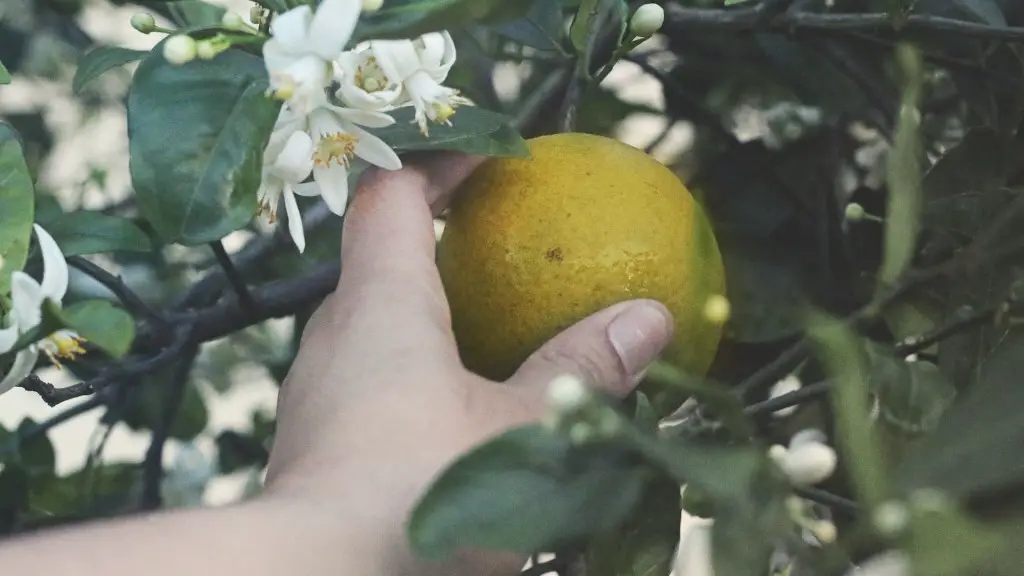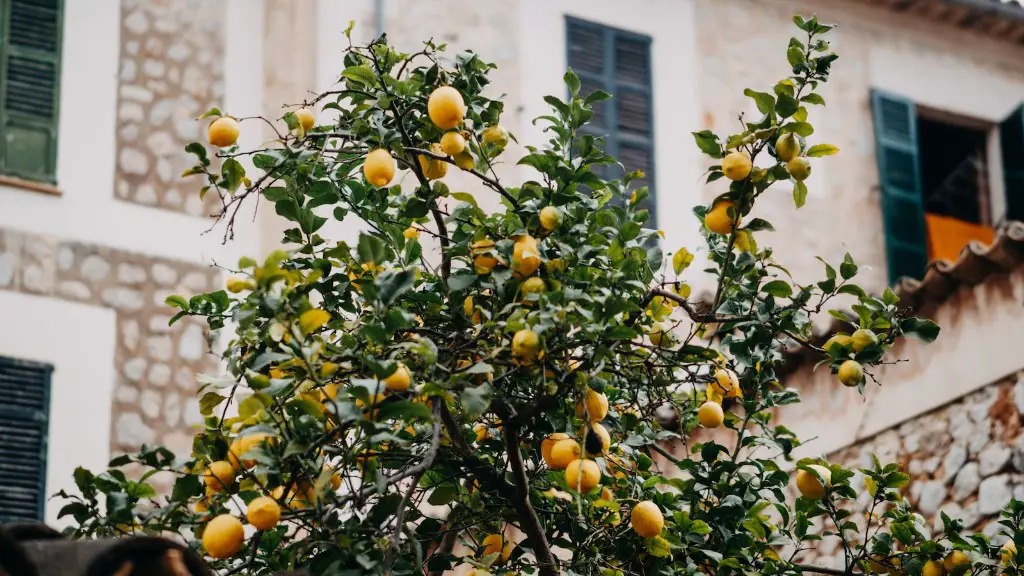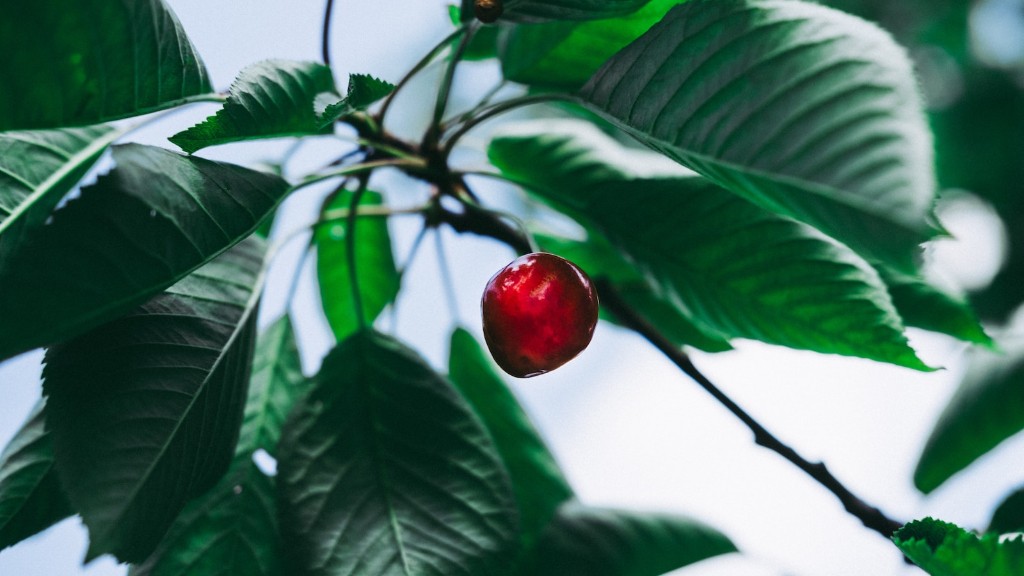Lemon trees are an important part of many home gardens. Growing juicy, tart lemons is rewarding, but how long does it take for them to bear fruit? The answer depends on several factors, but with proper care and some luck, you can expect to see lemons on your tree in about a year.
It all starts with the right tree. If you want your own citrus tree, find one that’s between 2 and 3 years old with a compact growth habit. Most lemon trees need full sun to thrive, so pick a spot in the garden that gets plenty of sunshine. Plant the tree in a large hole and use good quality soil to provide a strong foundation. Make sure to water it regularly and prune it regularly to maintain a good size and shape.
Once the right tree is in the right spot, fertilizing plays an important role in helping it bear fruit. Different types of lemon trees need different amounts of fertilizer, so check with your local greenhouse or nursery for specific instructions for your tree. Be sure to also keep the soil pH balanced and clear away weeds to give your tree the best chance of blooming.
With the right tree, soil, and nutrients, you can expect to see blooms appear in late winter or early spring. These flowers will then give way to young fruit, which will eventually ripen and turn yellow over the course of a few months. How long this takes depends on the tree and the climate, but it’s usually ready by the end of summer. The ripening process takes a long time and some patience, so just relax and enjoy watching your lemons grow.
To keep your lemon tree healthy, make sure to water it regularly during the growing season. Prune it regularly to maintain a good size and shape and keep an eye out for pests or diseases. If you see any, treat the tree with organic pest control or contact an arborist for specialized care.
Growing lemon trees takes patience and some luck, but it’s a rewarding experience. With proper care, you can expect to see your first batch of home-grown lemons in about a year. Happy gardening!
How Lemon Trees Bloom
To produce sweet, juicy lemons, lemon trees first need to bloom. The tree will begin to flower in late winter or early spring, and these flowers are the precursors to the eventual lemons. The blooms will be a white or cream color, and they will be small and delicate. If pollination occurs, the blossoms will eventually turn into tiny, green fruits.
To help these blooms turn into fruit, successful pollination needs to occur. Depending on different factors like temperature, rain, and pollinators, this process can take anywhere from two weeks to several months. To help the process along, some gardeners will gently shake the lemon tree or use a handheld electric vibration device to increase the odds of pollination.
How Lemon Trees Thrive
Lemon trees need the right conditions to produce the most flavorful fruit. The tree needs full sun to thrive and should be planted in a spot with well-drained soil. If you’re keeping the lemon tree in a pot, add some sand to the potting mix to help the soil drain and aerate faster.
Fertilizing the tree regularly and correctly is also important. Different types of lemon trees may require different amounts of fertilizer, so check with your greenhouse or nursery for specific instructions. Make sure not to give the tree too much fertilizer, as this could cause too much vegetation growth and no flowers or fruit. A balanced pH level and plenty of water are also necessary for keeping the lemon tree healthy and producing fruit.
Harvesting Lemon Trees
Once the blooms turn into fruit, the lemon tree will be ready for harvest in about 8-10 months. If frost has occurred in the fall, it’s possible that the fruits won’t fully ripen until the following spring. You’ll know it’s time when the lemons have turned from green to yellow, and their skin has lost some of its tautness. Gently twist or cut the lemons from the tree, and inspect each one for any signs of disease.
Lemons can be stored at room temperature for about two weeks, or for up to five weeks if stored in the refrigerator. The juice and zest can also be used in multiple recipes, and the leaves can be used to make a tea to aid with digestion and other ailments.
Possible Issues With Lemon Trees
Lemon trees are susceptible to various pests and diseases, which can prevent them from bearing fruit. Spider mites and aphids are the most common culprits, and they can be treated with neem oil, insecticidal soap, or other organic pest control solutions. If left unchecked, these pests can weaken the tree, creating an environment for plant diseases to move in. Some of the most common plant diseases are fungal and bacterial, and treatment usually involves removing the infected parts and spraying the area with a fungicide.
Other potential issues come from the soil. If the soil is not properly drained, the tree can suffer from root rot and other fungal diseases. It’s important to check the soil regularly and keep it well-drained to prevent issues and ensure the tree has access to the nutrients it needs to grow and bear fruit. Compacted soil will also limit root growth, which signals the tree to produce fewer or no lemons.
Fun Facts About Lemon Trees
Lemon trees are a unique part of many backyards, but there are a few facts about them you may not know. For example, Mediterranean climates, like those of Italy, Spain, South Africa, and California, are optimal for growing lemons. Also, some citrus fruits, like oranges and lemons, are actually hybrids of three different fruits: citron, pomelo, and mandarin. You can also create a lemon tree from a seed, but it will take up to 8 years before you see any fruit.
Lemons are an important food and flavor enhancer, and they have medicinal purposes as well. Lemons have astringent and antimicrobial properties, and their juice can be used to treat sore throats, calm upset stomachs, and even reduce outbreaks of cold sores. The juice can also be diluted and used to clean hard surfaces, and even works to remove odor and grease from pots, pans, and kitchen tools.
Lemon trees can be a beautiful addition to any garden and provide a great reward when they bear fruit. With the right care, you can expect to harvest your own lemons in about a year. Enjoy watching your tree blossom in the sun and get ready to enjoy the tart flavor of the fresh lemons.



